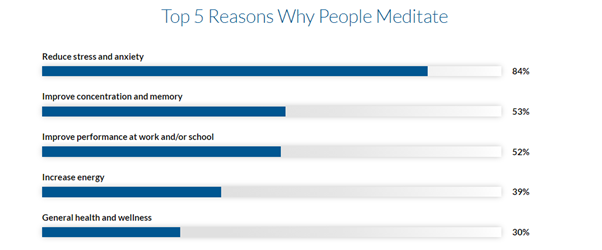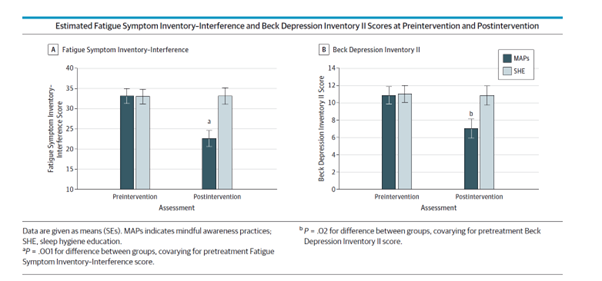In an interview in 2021, Novak Djokovic, the current World No. 1 tennis player stated the benefits of meditation in his day-to-day life. The Serbian tennis star said in the interview
“Meditation is really important to me; it is one of the main points in my day-to-day, not only in training or in my tennis career…. I have incorporated aspects of meditation into my daily routines, they make me feel good.” [1]
He stated that it’s challenging to be in a profession demanding high performance and requires higher level of concentration all time. He stated, “I think that today’s technologies and distractions that we have, don’t allow us to pay the necessary attention to relax, breathe, recharge batteries and focus on ourselves” [1]. D.jokovic currently has the record for the highest number of matches won in history,success rate of 83.43%. It is quite evident from Djokovic’s records and as per his admission, how meditation and mindfulness have benefitted him to achieve such an incredible record [2].
Apart from Djokovic, some of the highly successful celebrities such as media proprietor and actress Oprah Winfrey, NBA star athlete Lebron James, Billionaire Bill Gates, Podcaster & and commentator Joe Rogan, Apple co-founder Steve Jobs, actor Hugh Jackman, pop star Katy Perry and several others, have extolled the benefits of practicing meditation [3], [4].
Meditation Statistics:
It’s not just celebrities and highly successful people who have incorporated meditation into their daily lives. Even common people are actively pursuing meditation. It is estimated that 200-500 million people worldwide practice meditation [5]. The majority of people have cited that they practice meditation for stress or anxiety relief. People have also revealed that they meditate for general wellness, to prevent diseases and to have better sleep [6].

In today’s fast-paced and stressful world, ensuring physical and mental well-being has become crucial. Rooted in ancient traditions of Hinduism, Buddhism, Zen/Chan and Taoism. People around the world practice meditation to cope with the demands of modern life and to combat stress and anxiety. Several research studies and clinical trials have been conducted to determine how meditation works. Let’s review some of the scientifically-backed benefits of meditation.
Benefit 1: Reduced Stress and Anxiety
One of the most well-known benefits of meditation has been to reduce stress levels and anxiety. Meditation calms down the mind and regulates emotions. Meditation further helps lowering cortisol (stress hormone) production and reduces the risk of health issues associated with stress. Mediation also slows down racing thoughts, regulates breathing calms down the nervous system and reduces anxiety symptoms. Even a single meditation session has been found to significantly reduce anxiety levels and cardiovascular risk.
According to a study, published by General Hospital Psychiatry, people suffering from anxiety witnessed a remarkable and long-term positive impact on their mental health when they practised meditation for a course of 3 years. Regular meditation practice has demonstrated its ability to alleviate stress and improve symptoms linked to stress, including IBS, PTSD, and fibromyalgia.
Benefit 2: Improved Mental Health and Emotional Well-being
Meditation helps alleviate the symptoms of depression and improve the overall mood. It also raises self-awareness and self-compassion that fosters better self-understanding and understanding of relationships with others. Studies have shown that meditation reduces negative thoughts, decreases inflammatory chemicals. It also enhances impulse control and improves the ability to regulate mood.
Benefit 3: Enhanced Cognitive Abilities
A study conducted in 2018, found that meditation positively impacts cognitive abilities. Regular practice of meditation was found to increase the attention span and increase focus. Another research study published in Frontiers in Psychology showed that meditation helps combat age-related memory loss and dementia. Moreover, it is found to improve the problem-solving skills and creativity among those who practice meditation in the morning regularly. Thereby, unlocking new levels of productivity and innovation.
Benefit 4: Better Sleep Quality
Regular meditation practice improves sleep habits and leaves people feeling refreshed and energized upon waking. As per the clinical study published in JAMA Internal Medicine, Meditative asanas promote relaxation that has a positive impact on the autonomic nervous system. Thereby increasing the production of sleep hormones such as melatonin, it regulates the sleep-wake cycle and reduces the heart rate and blood pressure, that creates a more conducive environment for restful sleep.

Benefit 5: Improved Physical Health
Meditation also has a positive impact on overall physical health apart from mental health. Meditation has been found to reduce the pressure levels and enhance the cardiovascular health. Regular meditation practices such as yoga can reduce the stress response of the body, and combat chronic pain, fatigue and other conditions that are associated with a weak immune system.
Benefit 6: Prevention of Depression Relapse
Depression has emerged as a major mental issue and it can happen to anyone. According to WHO, nearly 3.8% of the global population are suffering from depression which is approximately 280 million globally. Depression is found to happen more among women than men and almost 5.7% of the adults older than 60 years of age suffer from depression [7]. Mindfulness-based cognitive therapy (MBCT) significantly lowers depression relapse by creating greater self-awareness and regulating emotions.
Benefit 7: Loneliness in Older people
Loneliness among older people is a growing concern as it is associated with various health conditions. Through meditation, it is possible to improve social connections [8]. A study published in BMC Psychology showed that when older adults practice meditation regularly, it generates self-compassion and a sense of connection that reduces the impact of loneliness on their well-being.
Benefit 8: Chronic Condition Control
Clinical studies have shown that meditation impacts a broad spectrum of physical and psychological disorders reducing anxiety, pain & depression, enhancing mood and increasing self-esteem. This helps in the management of chronic illnesses like cancer, psoriasis, fibromyalgia and hypertension. Medical practitioners also suggest meditation as either primary, secondary or even tertiary prevention strategies.
Benefit 9: Reduces Workplace Exhaustion
Emotional exhaustion at the workplace and work-related stress is a growing phenomenon in modern times. Studies have shown that Mindfulness-based stress reduction (MBSR) techniques can greatly reduce emotional exhaustion among employees. This also helps in bringing down stress levels and enhances job satisfaction and productivity in the workforce.
Benefit 10: Helps Coping with Addiction
Meditation can be a game changer in helping people suffering from addiction, get relief. People who are trying to recover from addiction to tobacco, alcohol, drugs or even food can implement meditation in their daily routine to negate the impact that these substances have on the brain. Further, it enhances the automatic response of the brain to automatic stimuli.
Conclusion:
There are vast benefits of meditation which are scientifically proven. Studies revealed that meditation has the potential to transform the lives of those who incorporate it into their daily lives. It has been seen that meditation made it easier for patients to better cope with the symptoms of COVID-19 and at the same time, mindfulness practices and meditation helped caregivers and healthcare professionals to manage stress, anxiety and depression. From reducing stress and anxiety to improving sleep quality and enhancing cognitive abilities, the benefits of meditation are immense. The rewards of meditation are endless and the journey towards a healthier life starts with a single breath. So, why not take a few moments each day to sit in stillness, focus on our breath, and cultivate a sense of calmness and mindfulness?
Frequently Asked Questions(FAQ)
Que1: How can you improve your mental health ?
- Practice mindfulness.
- Exercise regularly.
- Connect with loved ones.
- Seek professional help when needed.
- Maintain a healthy diet.
- Prioritize self-care and relaxation.
- Limit stressors.
Que2: Meditation, how does it work ?
Meditation involves focused attention or mindfulness to promote relaxation, reduce stress, and enhance self-awareness. It calms the mind, improves mental clarity, and supports overall well-being.
Que3: Is meditation helpful for anxiety and depression?
Yes, meditation can be helpful for anxiety and depression. It promotes relaxation, reduces stress, and enhances emotional well-being by improving mindfulness and self-regulation skills.
Que4: How to start meditation for beginners?
- Find a quiet space
- Sit or lie down comfortably
- Close your eyes
- Focus on your breath or a mantra
- Allow thoughts to come and go without judgment
- Start with short sessions and gradually increase time
- Use guided meditation apps or videos for support
- Be patient with yourself and practice regularly





